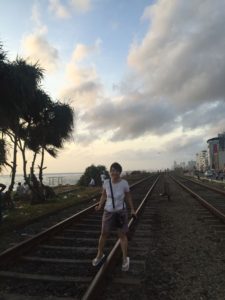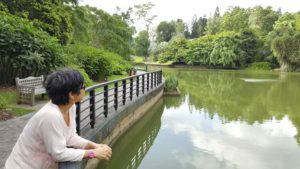SDEA Spotlight: Ruby Lim Yang
by SDEA

SDEA Spotlight is a series of short interviews with SDEA members that peel back the curtain behind their practice, their beliefs about arts and drama education and their influences. Ruby Lim-Yang has been developing children through Drama and Theatre since the 1980s. Currently the Artistic Director of ACT 3 International, she creates a range of platforms to engage, involve and empower children through the use of Drama and Theatre. Her belief is that children have a right to a culturally enriched life.
1. What are you working on at the moment?
Collaborations. The highlights of 2017 is creating work for pre-schoolers using Asian Traditional Arts and working with very established and experienced Singaporean traditional arts companies. We are working together, collaborating to create not just performances but also genre based workshops which follow right after the performances for a more immersive experiential learning journey for our young audiences.
Overseas. First stop will be in June to Croatia for an international children’s festival there that has been running for 35 years! A great way to share our multicultural background with a different culture and new audience.
Arts events. A collaboration that takes us into a gallery space in Ion to marry Drama and Visual Arts for children. A programme that promotes art making and performance making for children to explore their creativity and be engaged in imaginative and stimulating ways for personal discovery. Also making site specific performances for children and families during the Singapore Heritage Festival, Children’s Season at the Asian Civilisations Museum.
Schools. Preparing schools for THEIR students in year-end showcases. Schools whole heartedly promote the Arts through learning journeys in mounting stage productions. The excitement is astounding and although it is hard work from start to end, the outcomes are always inspiring. On-going is the preparation and planning a myriad of enrichment programmes for school term opening in July.
At Cairnhill. Schools will shut for holidays in a month’s time. Our Holiday Workshops with a varied range of themes suited to different age groups should keep our children and teens creatively engaged.
Theatre. Building a made to order set for a multi-talented Children’s Theatre artist whose solo piece will open in July at the Drama Centre Black Box to unveil his unique way of dramatizing the classic, Pinocchio. A producer’s heartbeat we wear for this one.
**

- What’s the direction of your work? Has it changed over the years?**
Our core focus of enriching the child’s life through the Arts. We have remained true to this vision from the very beginning. Over the years, we have come to embrace other forms in our work incorporating dance, visual arts, music but always with a focus on how to make these genres enjoyable and educational for children. Of late, we have another area of interest and that is BABIES and Drama for the very early years.
Drama for the Very Young has been a big part of our ACT 3 Drama Academy development since its inception in the mid-90s and more and more we have seen the immense benefits of Drama for the age group of 18 months to 2s and 3s. These early years are crucial years for a child’s development as research has proven time and time again, and we constantly explore ways of engagement to build a safe, creative and stimulating environment, and spaces which empower babies from the moment they can sit up.
3. What is a dream project that you hope to do?
I truly enjoy all the creative work and its related work, and the people I make the work with. We strive for the perfect project outcomes, but it never comes, so we keep going, finding, and doing. In reality, there is no dream project, but rather the “what’s next?”, similar to watching a great piece of Theatre. Large or small, the pleasure of doing is what I am after.
4. How did you start out doing what you do?
I co-founded ACT 3 in 1984, there were just three of us and as actors and makers, we pioneered the development of Children’s Theatre in Singapore, and we create our own work and performed them for children. Then, ten years after that, we established ACT 3 Drama Academy as our formal educational and enrichment arm to complement our work in Children’s Theatre, teaching Drama to children and young people in our own space as well as in the schools. Our Arts Education development grew from strength to strength over the years and we have since built a substantial body of work to deliver Drama for schools, communities, and organisations. Still very much focused on the young, our work in Arts Education is far reaching and we use Drama in strategic ways to empower the young to discover their creativity and to be confident about it. Simply it all started with a need to have children be active participants rather than passive audience members. Workshops were created and these short ad hoc workshops became longer workshops which then became formalised programmes and then ACT 3 Drama Academy was born.
ACT 3 International the company was created in 1994 to oversee the development of Arts Education not just in Singapore but also to seek adventures and opportunities overseas for performances, projects and programmes, and this led us to establishing ourselves as festival presenters presenting large flagship arts events like Children First! Singapore’s most visible children’s arts festival which went onto pioneer other festivals for children in Singapore. Today, we do a wide variety of work that marries Arts with Children in whichever ways possible.
**

- How do you keep your work fresh?**
I ask questions all the time. I also watch work, I have lots of conversations with my colleagues and associates. I keep learning and discovering, watching children play at every possible chance, watching youths at creating in the Drama space, talking, talking about the work and always listening to colleagues, friends, family at how they perceive the world they live in. Drawing from day to day, reading about other people’s work, always learning and staying open to various perspectives.
RELATED ASIDE The environment for children’s education and development now is vastly different from 30 years ago. In my work and life as a practitioner I have experienced over a period of three decades the importance, benefit and satisfaction of inculcating and building an awareness and appreciation for the Aesthetics, Art, Drama, Theatre, Music, Dance.
Drama is an excellent entry point for children in that intrinsically, their natural ability to play makes it easy for them to participate in Drama as PLAY underpins all that we do in Drama.
Children are steadfastly losing some attributes we once believed to be intuitive...being spontaneous, learning to give and take, naturally interacting with others. The simple ability to make eye contact, to converse, to share stories...these attributes we once believed to be natural to being human, are eroded by modern day living through advancement of technology, the need to be racing to the finish line, and the need to affirm the self by pleasing others.
Drama has the power to regain those innate attributes.
6. What do you think makes a perfect drama educator?
Pleasure.
7. Why is drama important? Why should it be taught in schools?
Drama is a very important educational tool because of its powerful impact on children in developing how they think, feel and respond. Its ability to transform even the most introverted to be inventive, to communicate and to be comfortable in the presence of others is unsurpassed.
Drama needs to be made accessible and FREE to everyone. In fact, it ought to be the RIGHT of every living human being to experience the benefits of Drama. Like walking in the park. Like drinking water without having to pay for it. It is not just the schools that need it. School is a very logical point of contact to reach out to a large group of people at one time. There are many more spaces other than schools to reach out to. Points of contact to reach out to groups of people, large or small, old or young. It has to start from young, to start early, with gusto and determination to realise the full potential of what it can do to the being.

8. Who was the drama educator that has the most impact on you?
Pioneers and trail blazers Winnifred Ward and Dorothy Heathcote, women who saw the potential of Drama and who saw the value in developing children.
9. What is your most memorable moment in the classroom/on stage? In the classroom – with very young children, eye contact. With teens, when they focus. On stage – being in the moment and knowing the audience is with you without having to prove or justify it.
10. Share a drama activity that you love to do.
Run around in the space. Then, on a cue, stop and face the audience as if you have been doing nothing. Less is more. Do less on stage.
11. What do you hope to see in Singapore's drama/theatre landscape in future?
Drama Landscape – everybody to want it like WATER. Pervasive and nothing mysterious nor in the hands of just a minority.
Theatre Landscape – In general, more honest stuff without trying too hard to prove a point. In particular, the acknowledgement that Children’s Theatre is not the same thing as family entertainment and the intellect of children to be respected.
12. In one word, sum up your drama education journey.
MORE.



